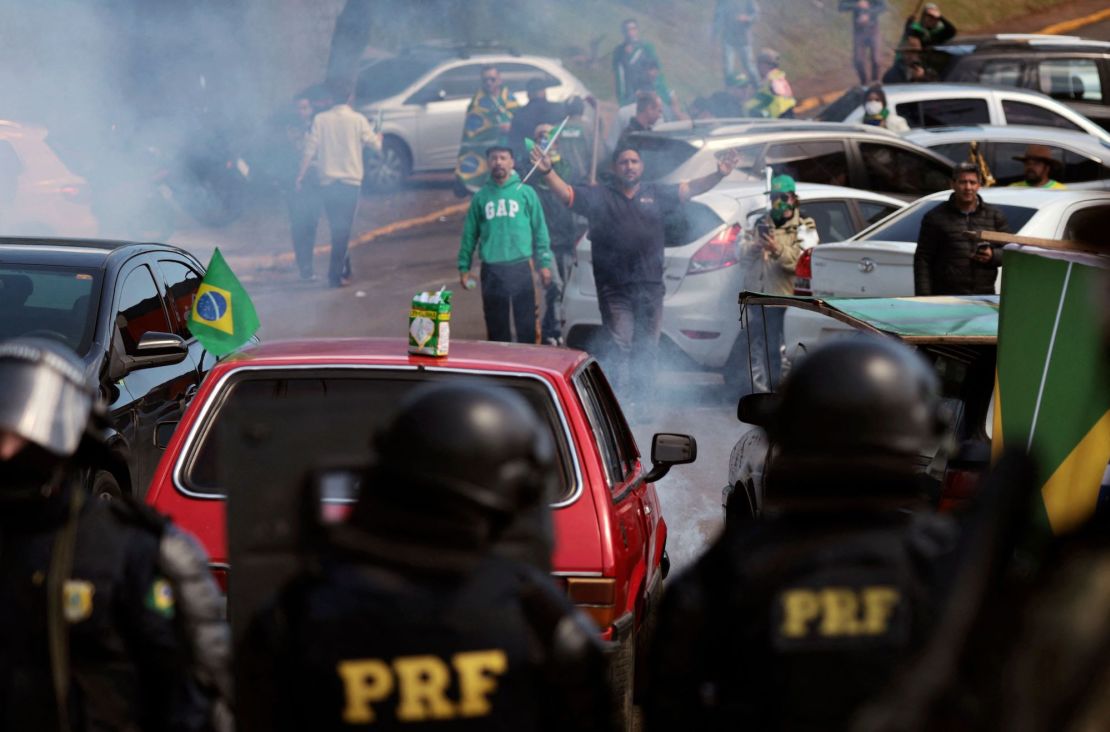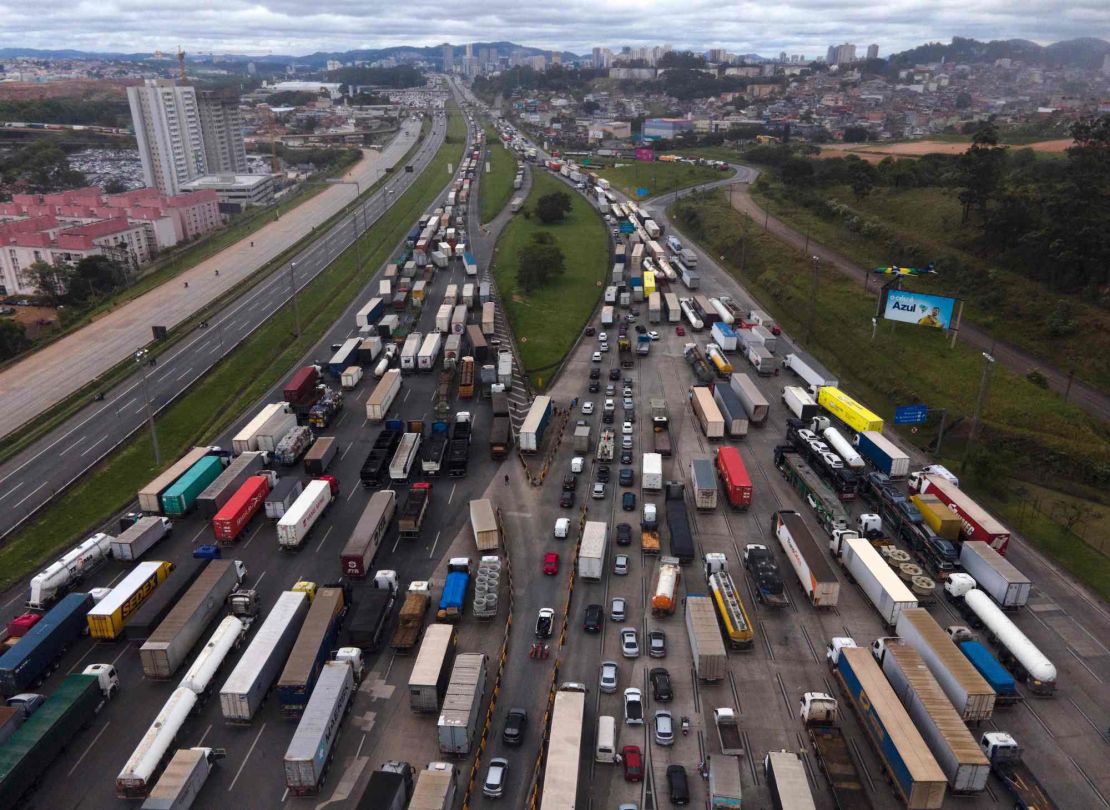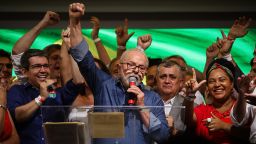Brazil’s President Jair Bolsonaro said Tuesday that he would “continue to fulfill all the commandments of our constitution” in a short speech at the presidential palace in Brasilia, after days of silence following his election loss to the leftist former leader Luiz Inacio Lula da Silva.
He did not explicitly concede defeat, though the event appeared to signal his intention to cooperate with the transfer of power.
Taking the podium after the President, chief of staff Ciro Nogueira said that he would work with the new government and is waiting for Lula da Silva’s transition team to begin the handover.
“President Jair Messias Bolsonaro authorized me, when it is time, based on the law, to start the transition process,” Nogueira said.
Notably, Bolsonaro’s brief address did not contest the vote result. Instead, he thanked those who voted for him and hit out at critics. “I have always been labeled undemocratic and, unlike my accusers, I have always played within the four lines of the constitution,” he said.

He did not congratulate Lula da Silva, who won with 50.9% of the vote, while Bolsonaro gained 49.1%.
The President-elect received the most votes in Brazilian history – more than 60 million votes, breaking his own record from 2006 by almost two million votes, according to the election authority’s final tally.

‘He wants to show strength’
Bolsonaro’s initial silence had contributed to fears that he would not cooperate with the transfer of power, after making unfounded claims prior to the vote about electoral fraud.
While his speech on Tuesday was short, experts speculated the reasons to why he refrained from explicitly conceding or contesting the election result.
“Bolsonaro wants to maintain this illusion that he was wronged, and that’s why he lost. He wants to show strength and in the culture of this movement, admitting you lost is to show weakness,” Brian Winter, the editor in chief of Americas Quarterly, told CNN.
“By saying that he’s going to respect the Constitution and by discouraging violence at some of the protests that have been happening, I think that (Bolsonaro) essentially paves the way now for a relatively normal transition,” Winter said.
Bruna Santos, a senior advisor at the Wilson Institute’s Brazil Center, said Bolsonaro was likely thinking of the long-term future of his movement.
“Bolsonarismo is a strong opposition force and got even stronger after this election despite Bolsonaro’s loss,” she said.
In the last legislative elections, Bolsonaro’s Liberal Party increased its representatives in the lower house from 76 to 99, while in the Senate it doubled from seven members to 14. Though Lula da Silva’s Workers’ Party has also increased representation in both houses, conservative-leaning politicians will dominate the next legislature overall.

Brazilian lawmakers and some Bolsonaro allies have already recognized Lula da Silva’s win. Brazilian Senate President Rodrigo Pacheco publicly congratulated Lula da Silva and his supporters, as has Chamber of Deputies President Arthur Lira – a close Bolsonaro ally.
‘Let’s go out to the streets’
Some pro-Bolsonaro Telegram groups seemed to take encouragement from Bolsonaro’s speech, which described ongoing protests as “the result of indignation and a feeling of injustice at how the electoral process took place.”
CNN saw messages from supporters lauding Bolsonaro for not accepting defeat, and green lighting protests.
“He didn’t recognize the defeat! He didn’t greet his opponent! He reaffirmed his respect for the Constitution! Let′s go out to the streets, more than ever, safe and certain!” one user wrote.
Protesters have wreaked havoc on the country’s highways since Sunday. Brazil’s highway police said Tuesday morning that protesters had blocked roads at 267 points across the country.
The highway police agency itself has faced criticism within Brazil over its response, after videos circulating on Brazil’s social media appeared to show officers telling protestors that they would not disrupt or shut down their protests.
In a press conference on Tuesday morning, highway police executive director Marco Antonio de Barros defended his agency’s actions, saying clearing the roads was a “complex operation.”
“Groups of up to 500 protesters, with children on their laps, elderly are participating in it. So the PRF had to act with plenty of caution,” he said, using an acronym for the highways agency.
Highway police general inspector Wendel Matos added the institution does not support the protests or the shutdown of federal highways, and that any potential breaches of protocol were being investigated. “Sometimes two or three officers speak or act in a way that is incompatible with our orders. We are investigating if there has been any misconduct by those officers,” Matos said.
After Bolsonaro spoke, Brazil’s Federal Supreme Court said that it was important to emphasize the “President of the Republic’s speech in guaranteeing the right to come and go in relation to blockades, and, when determining the beginning of the transition, in recognizing the result of the elections.”
President-elect Lula da Silva has not commented on the protests, though he expressed disappointment on Sunday evening at Bolsonaro’s initial failure to concede.
The leader of Lula da Silva’s Worker’s Party, Gleisi Hoffman, said on Tuesday that the party was confident protests would not interfere with the eventual transfer of power. “We trust Brazilian institutions,” she said.


